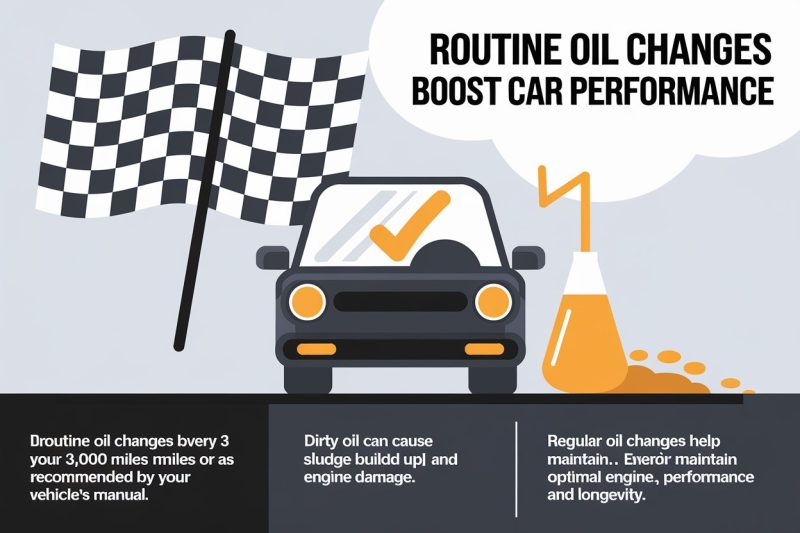Routine oil changes are one of the most crucial aspects of vehicle maintenance. They ensure that your car runs smoothly and efficiently for a long time. While it might seem like a simple, routine task, regular oil changes play a vital role in safeguarding your engine and improving overall vehicle performance. Fresh oil helps lubricate moving parts, reduces engine wear, and keeps your car operating at its best.
Oil is the lifeblood of your engine. Clean oil circulates through the engine, picking up debris, metal shavings, and other contaminants that can cause damage over time. By regularly changing your oil, you ensure that your engine stays clean and free from harmful particles. This minimizes wear and tear on engine components, making them last longer and work more efficiently.
Additionally, keeping your oil fresh can significantly improve your car’s fuel efficiency. Old, dirty oil makes the engine work harder, consuming more fuel in the process. By maintaining clean oil, you help your car burn fuel more efficiently, saving you money at the pump. Regular oil changes prevent the buildup of engine sludge, which can obstruct oil flow and reduce engine performance.
In summary, routine oil changes are more than just a minor service. They are essential for maintaining your car’s health, ensuring its performance, and extending its lifespan. By investing in regular oil changes, you protect your engine, improve fuel efficiency, enhance overall performance, and avoid costly repairs down the road.
Protecting Engine Components
Table of Contents
- 1 Protecting Engine Components
- 2 Improving Fuel Efficiency
- 3 Enhancing Engine Performance
- 4 Extending Vehicle Lifespan
- 5 FREQUENTLY ASKED QUESTIONS
- 6 1. Why are routine oil changes important for my vehicle?
- 7 2. How does oil quality affect engine performance?
- 8 3. How often should I change the oil in my car?
- 9 4. What happens if I don’t change my oil regularly?
- 10 5. Can routine oil changes improve fuel efficiency?
Clean oil is crucial for protecting engine components. It acts as a lubricant, reducing friction between the moving parts of the engine. Without clean oil, these parts can grind against each other, causing significant wear and tear. By keeping the oil clean and fresh, you help the engine run more smoothly and efficiently. Dirty oil is filled with debris and particles that can clog and damage the engine, leading to more serious and expensive problems over time.
Fresh oil also cools engine parts that heat up during operation. This helps maintain optimal engine temperature and prevents overheating, which can damage critical components. Additionally, clean oil creates a protective layer between metal parts. This layer minimizes direct contact, reducing the risk of corrosion and extending the life of the engine. Regular oil changes ensure that this protective barrier remains effective.
Changing the oil regularly helps remove contaminants that accumulate over time. This includes dust, dirt, and tiny metal shards that can cause damage if left unchecked. By flushing out these harmful substances with each oil change, you protect the engine from unnecessary wear and potential breakdowns. Keeping engine parts well-lubricated and clean is essential for maintaining a healthy and long-lasting engine.
Improving Fuel Efficiency
Oil quality significantly affects your car’s fuel economy. When oil is fresh and clean, the engine runs more efficiently, consuming less fuel. Clean oil reduces internal friction, which allows the engine to operate smoothly without having to work harder than necessary. This efficiency translates to better fuel mileage, saving you money on fuel over time.
Another benefit of regular oil changes is the prevention of engine sludge. Sludge forms when old, dirty oil breaks down and thickens, clogging the engine and increasing friction. This makes the engine less efficient and leads to higher fuel consumption. Keeping the oil clean prevents sludge buildup, ensuring that the engine remains efficient and fuel consumption stays low.
Using high-quality oil during changes can further improve fuel efficiency. Look for oils recommended by your vehicle’s manufacturer. These oils are formulated to provide the best performance and protection for your specific engine. By using the right oil and keeping it clean through regular oil changes, you can maximize your car’s fuel efficiency and save money at the pump.
Enhancing Engine Performance
Fresh oil plays a key role in maintaining your car’s engine performance. When the oil is clean, it helps ensure that all the moving parts in the engine glide smoothly. This reduces the strain on the engine and allows it to function more efficiently. As a result, you will notice a smoother and quieter ride, which makes driving more enjoyable.
Regular oil changes also help in preventing the engine from overheating. Over time, engine oil breaks down and loses its effectiveness in absorbing heat. Dirty oil can’t cool the engine parts efficiently, leading to overheating, which can severely damage the engine. By routinely changing the oil, you keep it fresh and effective at regulating engine temperature, thus preventing overheating and potential engine failure.
High-quality, clean oil also improves the overall response of your vehicle. The engine runs more smoothly, which translates to better acceleration and a more responsive driving experience. This immediate improvement in performance makes regular oil changes a simple yet powerful way to maintain optimal engine function and enjoy a better driving experience.
Extending Vehicle Lifespan
Consistent oil change intervals provide long-term benefits for your vehicle. Regular oil changes keep the engine clean and functioning at its best. Over time, this practice helps extend the lifespan of your engine and, by extension, your car. Vehicles that receive regular maintenance typically last longer and perform better than those that do not.
Regular oil changes also help you avoid costly repairs. By maintaining clean oil, you prevent sludge buildup and excessive wear on your engine parts. This proactive approach to car maintenance means you’re less likely to face major engine problems that require expensive repairs. Keeping the engine well-lubricated and clean ensures that you catch minor issues before they become major headaches.
Here are some benefits of consistent oil change intervals:
- Prevents engine wear and tear
- Reduces the likelihood of unexpected breakdowns
- Ensures better fuel efficiency over the car’s lifespan
- Maintains optimal engine performance
- Increases the resale value of your vehicle
Conclusion
Routine oil changes are essential for maintaining your car’s performance and longevity. They protect engine components, improve fuel efficiency, enhance engine performance, and extend your vehicle’s lifespan. By investing in regular oil changes, you ensure that your car runs smoothly, efficiently, and reliably for years to come.
Taking care of your car with regular oil changes is a smart and simple way to avoid costly repairs and keep your vehicle in top condition. If it’s time for an oil change or you want to schedule regular maintenance, consider reaching out to professionals who can provide expert service.
Ensure your car stays in great shape by scheduling an oil change in Woodstock, GA, with My Mechanic Joe today. Trust our skilled mechanics to keep your vehicle running smoothly and efficiently. Contact us now to book an appointment and experience the benefits of professional auto care.
FREQUENTLY ASKED QUESTIONS
1. Why are routine oil changes important for my vehicle?
Routine oil changes are crucial for maintaining your vehicle’s health. Regularly changing your engine oil ensures that your engine is lubricated with clean oil, which reduces friction between the moving parts of the engine. This lubrication minimizes wear and tear, preventing potential damage and keeping your engine running smoothly. In essence, oil is essential for optimal engine performance and longevity.
2. How does oil quality affect engine performance?
The quality of your motor oil greatly impacts engine performance. Using high-quality synthetic oil can provide better protection against heat and wear compared to conventional oil. Fresh oil contains additives that help clean the engine and prevent sludge buildup, which can hinder performance. Consequently, using the right type of oil and maintaining a regular oil change schedule allows your engine to perform at its best.
3. How often should I change the oil in my car?
The oil change interval can vary based on the vehicle’s make and model, driving conditions, and the type of oil used. Generally, it’s recommended to get an oil change every 3,000 to 7,500 miles for conventional oil, while synthetic oil can last longer. Always refer to your vehicle’s manual for specific guidelines, and consider factors that might require more frequent oil changes, such as severe driving conditions.
4. What happens if I don’t change my oil regularly?
Neglecting regular oil changes can lead to the deterioration of your engine’s performance. As dirty oil accumulates, it loses its lubricating properties, which can cause increased wear on moving parts. This can lead to overheating, reduced fuel efficiency, and ultimately catastrophic engine failure. In short, not changing your oil regularly can cause your engine to work harder and decrease its lifespan.
5. Can routine oil changes improve fuel efficiency?
Yes, routine oil changes can significantly enhance your vehicle’s fuel economy.

